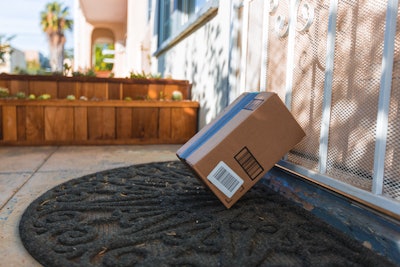
ShipStation released new findings from its second annual national consumer study, which outlines how consumer shopping habits and shipping's impact on brand perception has changed over the past year. According to the report, "Last Touch, Lasting Impact: The 2020-2021 Edition," North American consumers said they have increased online shopping by 33% over the past year, with nearly two-thirds agreeing that the majority of their shopping is now done online as a result of the pandemic. And, supply chain challenges due to the sharp increase in online shopping have only made the delivery experience more influential in 2020. As the final touchpoint with the retailer, 84 percent of shoppers say it stands out most in the e-commerce customer experience -- up from 80 percent in 2019.
"As the pandemic forced nearly every industry to shift to digital operations, the retail industry saw a massive surge in e-commerce purchases followed by major strain on the supply chain," said Cindy Schulz, General Manager at ShipStation. "Our data shows that while consumers have become a bit more patient as a result, shipping still plays a critical role in converting and retaining customers. In fact, 92 percent agree that knowing their order will arrive when expected is a key factor in their online purchase decisions."
Additional key findings from the report include:
The Pandemic's Effect on Shipping Expectations Cost and speed of shipping are non-negotiables for online shoppers, as nearly all (97 percent) say shipping costs are important and 92 percent say shipping speed is important when making an online purchase decision. While efficiency remains key, the study reveals that the pandemic contributed to a temporary reset in consumer expectations of shipping speed, with the window in which consumers expect to receive online purchases increasing to eight days -- up from a five-day window in 2019. Although 79 percent agree that they are okay with slower shipping as a result of the pandemic, six in 10 reported that lowered expectations and understanding of longer delivery times are only here for the short-term. The study shows that greater understanding comes with greater costs, with two out of three consumers now expecting all brands to provide free shipping options in light of slower-than-normal shipping speeds.
Returns Are No Exception More than half (54 percent) of online shoppers are also influenced by retailers' return policies, with free and easy topping the list of consumer requirements. In fact, while down 5 percent from 2019, a whopping 89 percent believe that retailers should offer free returns. Additionally, 85 percent expect the process to be self-service, requiring no contact with customer service. And in light of recent safety precautions, 67 percent of shoppers say they plan to steer clear of in-store returns, opting instead for mailbox drop-off (67 percent) or porch pick-up (66 percent) options.
Delivery's Impact on Brand Perception and Long-term Loyalty While 79 percent have no preference when it comes to which carrier delivers their order, 80 percent of consumers believe that it is ultimately the responsibility of the retailer to ensure products are delivered on time and as expected. And brands face major risks if they get shipping wrong, with 90 percent of consumers saying a bad shipping experience negatively impacts their overall shopping experience, and 87 percent saying that it makes them less likely to shop with that retailer again in the future.
A Lasting Impression: Getting it Right While mistakes are bound to happen, 93 percent of shoppers say that if a retailer acknowledges a poor delivery experience, they would still shop with them in the future. In order to maintain brand loyalty, 60 percent say that retailers offering discount codes for future purchases will keep them coming back. Lastly, customers want to stay informed more than ever with 79 percent agreeing that their experiences this year have increased expectations around brand communications when it comes to delays or cancellation updates. More specifically, 89 percent expect brands to proactively address potential shipping delays prior to checkout.
Lockdowns due to the pandemic forced retailers to pivot nearly overnight. However, as more shoppers continue to move online, retailers still have a massive opportunity to not only capture new customers but also increase customer retention. While consumers are understanding, their trust still lies with the retailer. With tailored shipping options and increased transparency, smart brands can turn shipping into their secret weapon for success.















![Pros To Know 2026 [color]](https://img.sdcexec.com/mindful/acbm/workspaces/default/uploads/2025/08/prostoknow-2026-color.mduFvhpgMk.png?ar=16%3A9&auto=format%2Ccompress&bg=fff&fill-color=fff&fit=fill&h=135&q=70&w=240)
